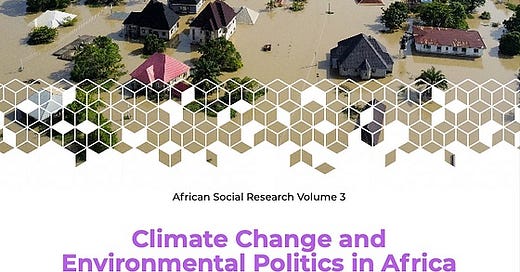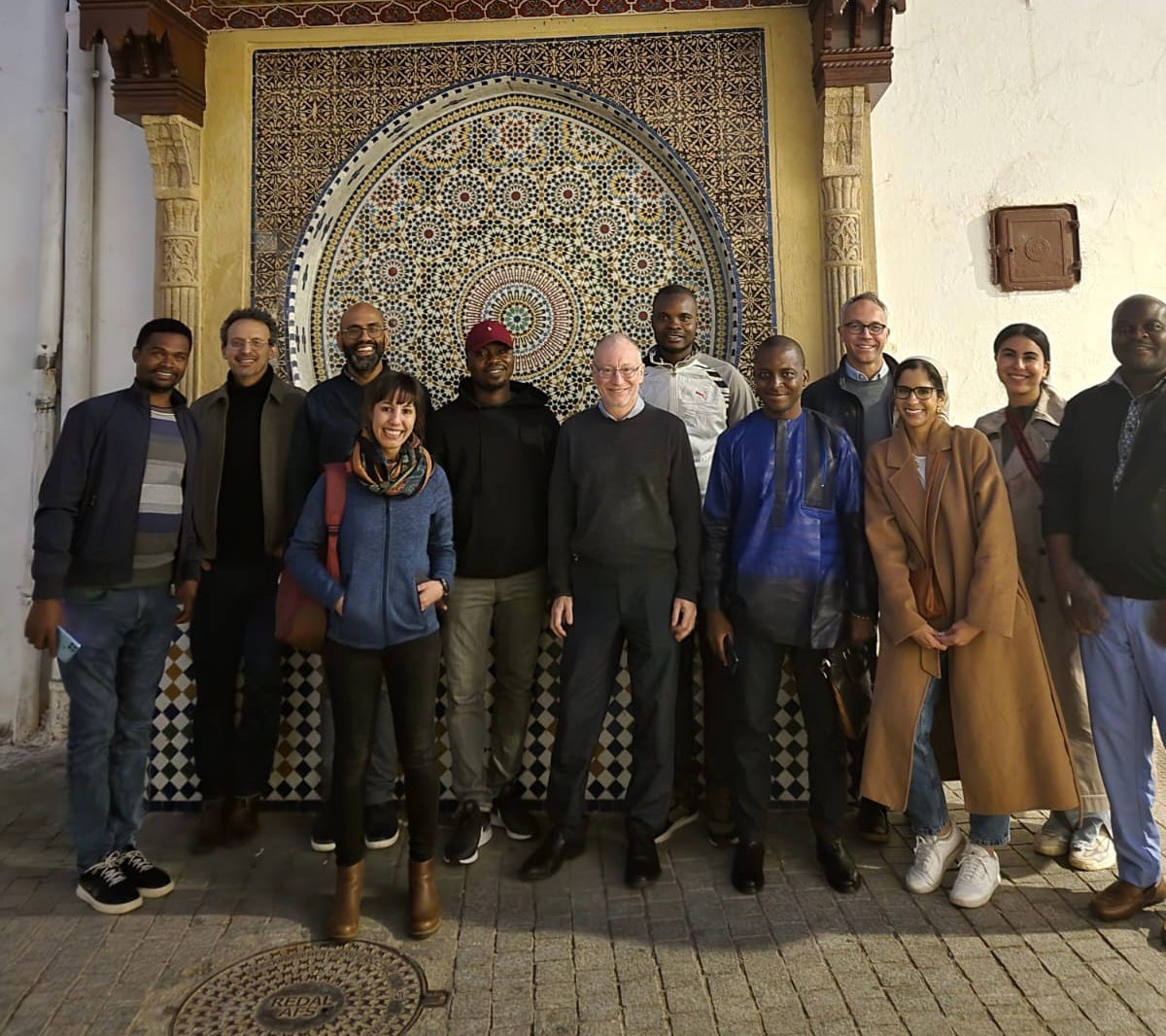NEW: Climate Change and Environmental Politics in Africa
A new issue of African Social Research features a dozen rising African scholars
This January, the Program on African Social Research held a junior scholar workshop in Rabat, Morocco at the Mohammed VI Polytechnic University. A dozen scholars from across the African continent convened to present papers and discuss issues related to climate change and environmental politics. I’m delighted to announce that the papers from that workshop have now been published as the third issue in PASR’s open access journal African Social Research, with an introductory essay by me and guest co-editor Adam Branch. You can download it for free here, along with the first two issues (ASR 1: Africa in Movement focused on intra-African migration, and ASR 2: The Struggle for Democracy in Africa focused on, well, the struggle for democracy in Africa).
For those who don’t know, PASR (Pasiri, for short) was launched a few years ago by Zachariah Mampilly, Hisham Aidi and me with the mission of building research networks and supporting the work of excellent junior scholars from across the African continent (as well as African scholars based in American and European universities). The junior scholar workshops and publications are modeled in part after POMEPS and the POMEPS Studies open access journal series; I’m the lead editor of both of them, which is not a small amount of work but which I find profoundly rewarding. POMEPS and PASR have collaborated multiple times already, as we pursue a shared mission of breaking down artificial regional constructs and barriers and promoting transregional research agendas: I’m so pleased that our two previous collaborations (Racial Formations in Africa and the Middle East: A Transregional Approach and Africa and the Middle East: Beyond the Divides) are two of the most widely read and cited POMEPS publications.
The workshop in Rabat and the collection of essays now available for you to read generated some really fascinating critical perspectives on issues surrounding adaptation to climate change, longer histories of environmental violence, and the tension between indigenous knowledge and Western scientific approaches (often backed by postcolonial and neoliberalizing African states). To me, it’s genuinely interesting to compare how African scholars discuss these issues compared with the approaches by MENA scholars in the POMEPS Studies issue on Environmental Politics which I co-edited with Jeannie Sowers last year. I’d suggest reading the two collections in tandem to really see the transregional comparisons and forms of knowledge production which we’re trying to promote. Below, I’m happy to reproduce the framing essay which the amazing Adam Branch helped craft. Enjoy!
Participants in the PASR workshop in Rabat, Morocco
Climate Change and Environmental Politics in Africa
Adam Branch and Marc Lynch
The threat posed by climate change to the African continent has attracted a great deal of attention from policy communities in recent years. But climate change is more than just the intensifying physical impacts of global warming. Indeed, climate change is invoked by state officials, donors, international agencies, NGOs, civil society activists, and media to justify a wide range of policies, claims, and interventions throughout society. Adaptation, mitigation, resilience, and sustainability are now everywhere and are themselves having a wide range of different impacts, subject both to celebration and to intense critique. Meanwhile, environmental historians, anthropologists, and geographers in African Studies have shown that contemporary climate change needs to be grounded in longer environmental, political, and social histories, and shown the ways that different communities and individuals can attribute vastly different meanings to the same landscapes or environmental or climatic processes. But the voices of scholars from the African continent itself have been less prominent: a recent study of 156 peer-reviewed journal articles published on African energy transitions between 2000-2021 found that only 25% of them were authored by African scholars, and that there were systematic blind spots in their topics, methods, and policy recommendations.
In January 2023, the Program on African Social Research convened a workshop at Mohammed VI Polytechnic University in Rabat, Morocco, to discuss the many possible meanings and forms of the politics of environmental change. A diverse, multidsiciplinary group of almost a dozen early career scholars from across the continent participated in two days of discussions, searching for both commonalities and differences in the political experience of the environment. Their papers are collected here as a starting point in a broader cross-African conversation, with the goal of centering African knowledge production and bringing the voices of emerging scholars from the continent into the conversation about environmental politics and climate change. These papers illuminate the ways these different meanings are constructed, as well as drawing out the political implications of the contestations over these divergent understandings.
The first major theme that emerged was the importance of being attentive to indigenous or local knowledge of the environment in contrast to the expert knowledge claimed by Western science. Sometimes, the former is identified as particularly African forms of thought, while the latter is identified as Eurocentric and Western, even if its proponents may be African themselves. As the papers explore, these different forms of understanding can underpin different modes of environmental practice. On the one side, we see, for instance, the locally meaningful processions of the Amazigh talghnja ritual (see Bourhrous in this collection) or traditional modes of adapting to climatic variability in the Niger Delta (see Boroh and Jack in this collection). In comparison, osttensibly expert, Eurocentric knowledge can underpin incoherent or inappropriate modes of dealing with environmental disruption, only exacerbating challenges faced by communities while sidelining forms of adaptation well grounded in long local histories and practices. Traditional strategies of adaptation to rising water levels or to drought may seem irrational or misguided to foreign experts, but in fact reflect lessons learned at the local level through centuries of experience and practices consistent with existing social structures and cultural norms.
Disjunctures can also arise between internationally driven projects imposed in the name of climate change adaptation or mitigation for global environmental benefit – such as the Ouarzazate Solar Power Plant (see Bengezi in this collection) – and their impacts upon local communities. Global mitigation efforts rooted in international best practices and technologically-driven mega-projects can produce intense local environmental violence with differential impacts on marginalized communities (see Ou-Salah in this collection). As Mukamba shows in this collection, such disconnects between local forms of practice rooted in local knowledge and global projects rooted in scientific expertise show the dangers inherent in such top down approaches. As James Scott long ago reminded us, top-down efforts to standardize and impose large scale development projects too often end badly.
Public debates and contentious discourse over environmental politics are a key window into these disconnects between the global and the local, and between scientific expertise and indigenous practice. Chikaipa’s contribution to the collection shows how different understandings of the environment in Malawi can play themselves out in debates among activists, NGOs, government officials, corporations, and the state about an environmentally-driven ban on single-use plastics. Ou-Salah’s shows how Moroccan women have struggled to challenge their marginalization and vulnerability through contentious social movements which center gender and legal rights. Lunyago’s closely tracks the intense debates over land degazetting in Uganda, showing how political actors challenge environmental justifications to expose the corrupt political economy driving such practices. The mounting environmental crisis that many of the papers refer to can lead to the realignment of different actors and forces into new alliances, or to further fragmentation of positions. What arises from the papers as a whole is a picture of the intense, complex, and deeply significant debates around environmental understandings and around just solutions to environmental harm.
The papers engage the insights of the literature on political ecology to reveal how firmly embedded environmental and ecological processes and crises are in social and political structures. While global climate change can seem abstract, social and political factors produce environmental change directly – whether oil companies poisoning the land, mining firms contributing to atmospheric pollution, or states dispossessing peasants of land in the name of conservation. The papers demonstrate how social and political factors need to be taken into consideration in order to understand the uneven vulnerability of different communities and groups to environmental harm. The papers look back to colonial histories as establishing the frameworks in which environmental damage is inflicted today, often with total impunity, as well as to the more recent history of neoliberalism gutting state capacity and social resilience to cope with environmental disaster. Today, it is the continuation of capitalist extractivism, whether of scarce minerals needed for the “green” energy transition, land for solar plants, or oil for the fossil economy, that creates the context for environmental devastation. Critically, the essays explore existing inequalities and divisions within communities – in particular along intersecting lines of gender or class – ensure different experiences of environmental harm, in particular the “slow-onset harm” associated with mounting climate change. Climate change is not just an environmental process but also a social process, and these papers help establish the importance of critical social science to accompany environmental science.
Finally, these papers show the importance of historicizing contemporary climate change. The environment has long been intertwined with and constitutive of political and social institutions. The Niger Delta’s rising sea levels and changing precipitation patterns caused by global climate change are part of longer history of environmental devastation caused by the fossil fuel economy via oil and gas extraction. These global environmental changes are realized through and in the context of particular local environmental and climatic histories that need to be accounted for. But the interventions and policies occurring in the name of adapting to or mitigating climate change are also part of longer histories of often unaccountable intervention and dispossession. Throughout the essays, we get a picture of the overwhelming unpredictability and uncertainty that is increasingly coming to characterize African environments. This uncertainty is produced not just by global climate change but also by long histories of environmental violence, by interventions in the name of resolving climate change, and by high-stakes debates and contestations among different communities and actors over the present and future of the natural world.





